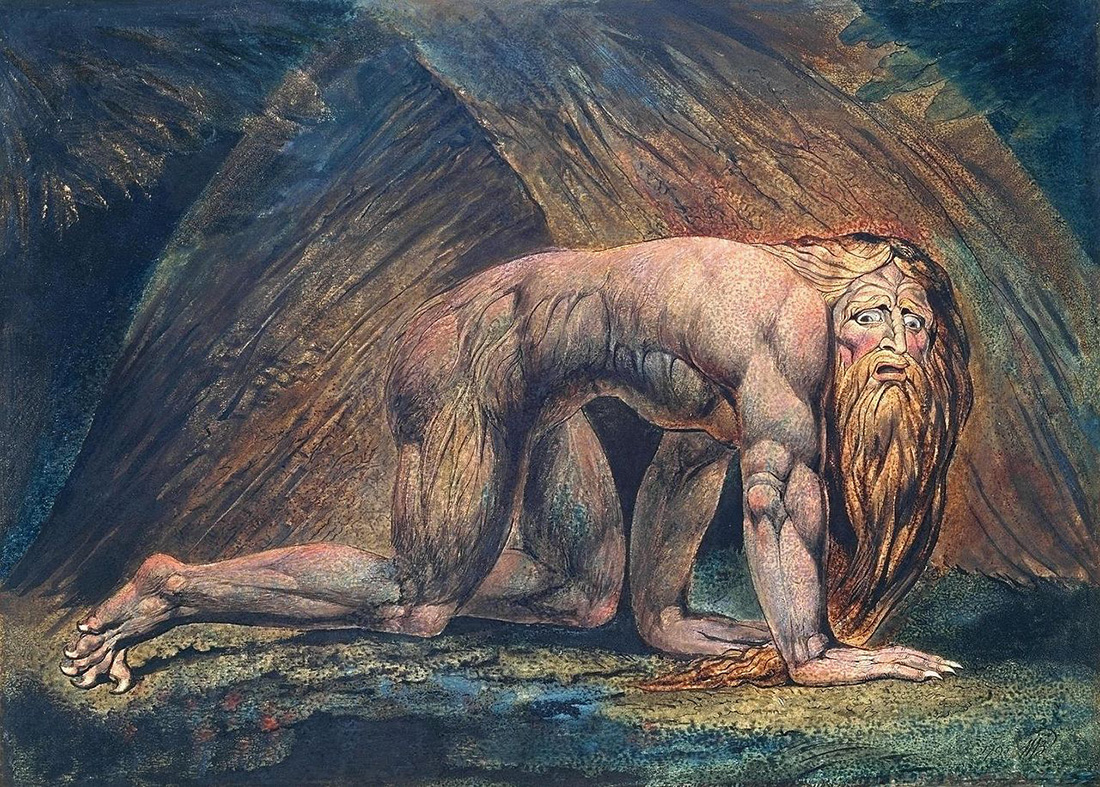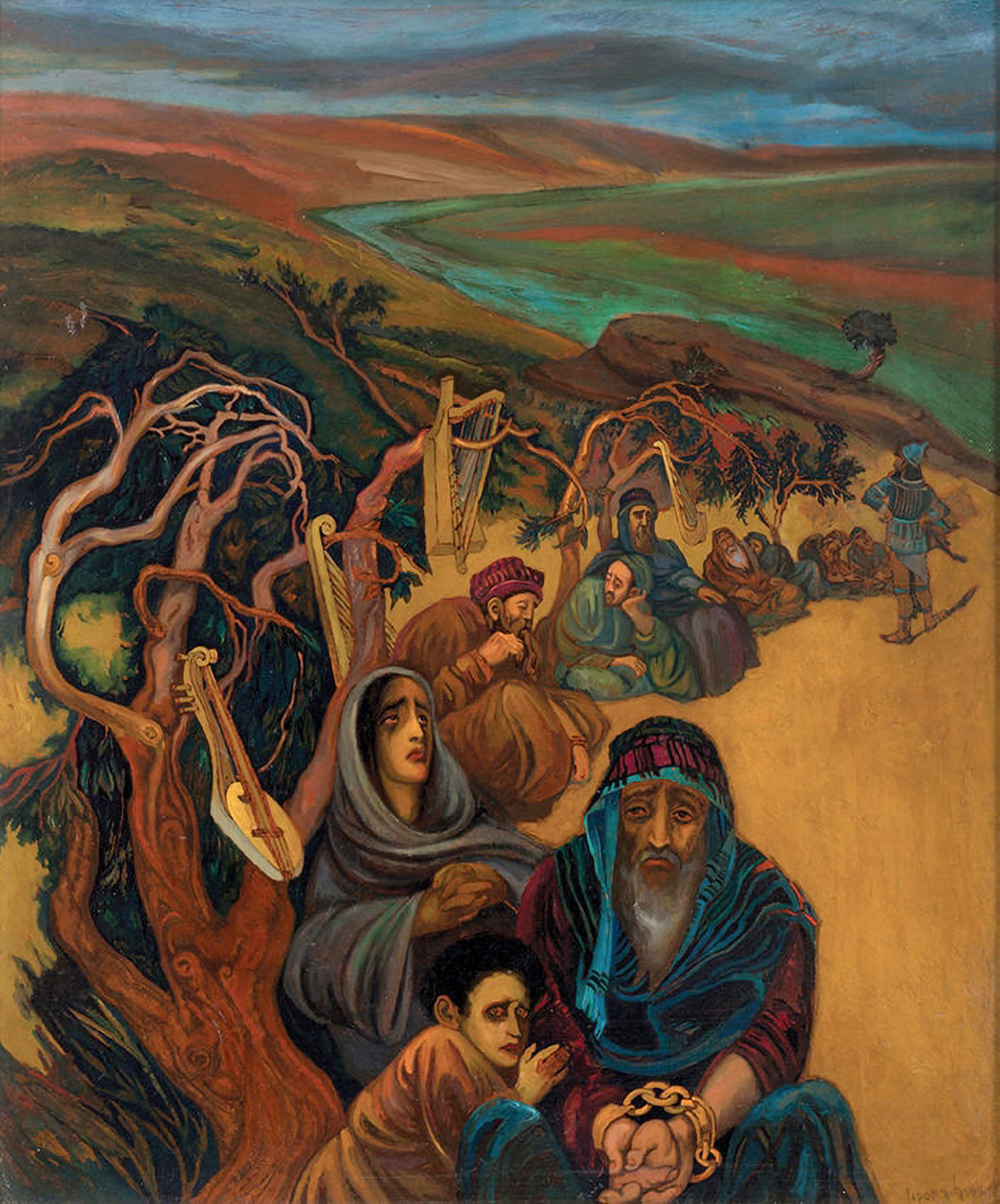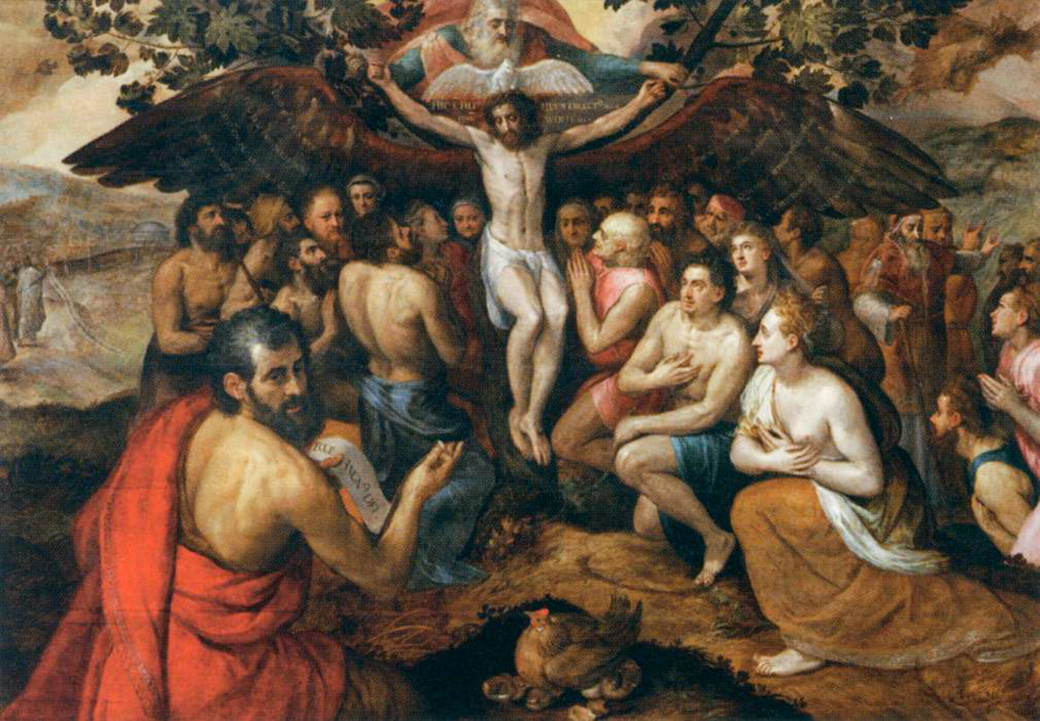Wednesday in the Fifth Week of Lent: Daniel 3:14-20, 91-92, 95, John 8: 31-42.
Today’s readings give us a glimpse of what it looks like to be freed from the slavery of sin alongside the Son of God and also what it looks like to be stuck in our slavery. It’s clear that faith is the key ingredient.
The first reading from the Book of Daniel is the other perspective of the reading we had two weeks ago (which we discussed in Mercy is the Master Principle). The young Jewish men named Hananiah, Mishael, and Azariah were given Persian names by King Nebuchadnezzar’s chief official. As we hear, they are called Shadrach, Meshach, and Abednego; it is a form of forced assimilation, as is the king’s decree that all must bow and worship the golden statue he has erected. But our young Jewish men refuse, and when called in front of the king to explain themselves, they profess their faith in the God of Abraham. Their speech is noteworthy:
If our God, whom we serve,
can save us from the white-hot furnace
and from your hands, O king, may he save us!
But even if he will not, know, O king,
that we will not serve your god
or worship the golden statue that you set up.
Their faith does not depend on a display of power from God. They say “if he can save us, may he do so.” Importantly, they add, “even if he will not save us, know that we won’t serve your god or worship your statue.” Now that’s a refreshing display of faith. We’re used to hearing laments of how God can forsake His people, yet these three aren’t filled with fear, doubt, or anger.

The passage we read a few weeks ago provides Azariah’s great prayer, but today we hear instead the reaction of the king before they are cast into the fire: his “face became livid with utter rage,” he heats the furnace up “seven times more than usual” and has “some of the strongest men in his army” bind them and cast them into the fire. His over-the-top, emotional reaction is emphasized in his unnecessary measures like superheating the furnace and having his strongest men cast them in. This is the reaction of human, earthly power when it is defied. It’s a show of power that is truly impotent in the face of a power that comes not from this world. Contrast this with God’s patience and mercy when we defy Him. Also, let’s contrast this with God’s wrath, which he has under control, does not use unjustly or emotionally (see The Purifying Fire We Call God’s Wrath).
In all of his power, King Nebuchadnezzar becomes an archetype of someone who is a slave to sin. His power, extreme passions, and pride distort his soul and the breath of divinity God has placed in humanity. He cannot blossom in his humanity, which requires embracing love. In fact, he eventually goes mad (see William Blake’s illustration below): “He was driven away from people and ate grass like the ox. His body was drenched with the dew of heaven until his hair grew like the feathers of an eagle and his nails like the claws of a bird. At the end of that time, I, Nebuchadnezzar, raised my eyes toward heaven, and my sanity was restored. Then I praised the Most High; I honored and glorified him who lives forever” (Dn 4:33-34). God shows us that when we are enslaved to sin, we become no more than base animals. It is the spark of divinity in us that raises us up from that state. God frees us from the slavery of sin, a type of insanity and animalism.

King Nebuchadnezzar is the figure who shows us slavery to sin but he is also the one who points out the state of being freed from sin and blessed by God. In today’s reading, he makes another notable comment. Upon seeing figures still standing in the furnace, he exclaims, “I see four men unfettered and unhurt, walking in the fire, and the fourth looks like a son of God.” This clear choice of words, לְבַר־ אֱלָהִֽין׃ (bar-Elahim), when read with the full view of salvation history provided by Jesus Christ, is a reminder that when we are blessed with eternal life, we live with the Son of God. Elsewhere, this figure is identified as an angel of God, but here, viewed through the white-hot fire intended to purify — the trial by fire that these young men have survived — this salvific figure is seen as the Son of God.
This brings us to Jesus in today’s gospel from St. John. This is the third of four consecutive days we read from chapter 8 of John’s gospel where Jesus is displayed in a series of confrontations with dubious Jews in the temple area. On Monday, he schooled the scribes and Pharisees who attempted to bring him an adulteress for judgment, establishing that he was the law in letter and spirit. Yesterday, he made bold claims of his authority and parentage, noting that by disbelieving in His divinity, they will die in sin. Today, he turns to what should be a more trusting audience than the Phariseees, “those Jews who believed in him.” But even with these people, we find that their elevated notions of who they are get in the way of hearing His message.
He tells them, “If you remain in my word, you will truly be my disciples, and you will know the truth, and the truth will set you free.” What a lovely promise! And a quotable quote, as they say, for 21st-century thinking: the truth will set you free. Our contemporary problem is that we ignore that the truth comes only from the Son of God and we think some other “truth” that we will discover will set us free. The problem in Jesus’s time was the second half of the aphorism, the “set you free” part. They object: “We are descendants of Abraham and have never been enslaved to anyone.” Slavery was a very much a reality in these days. They object to the use of the word because it has real-world implications and a terrifying historical value for them.

But Jesus doesn’t budge. Much like he does in re-framing their worldview around death and life with the raising of Lazarus (see See the Glory of God), he is determined here to re-frame their understanding of slavery and freedom. He explains, “everyone who commits sin is a slave of sin. A slave does not remain in a household forever, but a son always remains. So if the Son frees you, then you will truly be free.” His point is an important one: we slaves cannot stay in the Father’s house, the Kingdom of God, of our own volition, good works, faith, or anything else we do. It is only when the Son frees us that we stop being slaves and can become adopted sons and daughters of God. How does the Son free us? He brings us the truth from the Father about how we must order our lives, and we must fully accept His truth. He also brings a New Covenant, established on the Cross, that pours out the liturgy upon us, and we must participate as one Church in this everlasting liturgy of life in order to stay in the Kingdom and no longer be slaves to sin.
Today’s reading continues as he urges them to do what the Father has said, “I tell you what I have seen in the Father’s presence; then do what you have heard from the Father,” but they continue to oppose His point of view and the truth He is giving them. They respond that their father is Abraham, sadly identifying themselves primarily through their human progenitor rather than their Creator whom they supposedly love and worship above all else. Jesus meets them here, however, and says,
If you were Abraham’s children,
you would be doing the works of Abraham.
But now you are trying to kill me,
a man who has told you the truth that I heard from God;
Abraham did not do this.
You are doing the works of your father!
Jesus will tell them even more about his relationship to Abraham in tomorrow’s reading. Here, he notes that they can’t be true children of Abraham because they are doing something he did not do; that is, Abraham listened to and obeyed God no matter how difficult His commands, while they are not. Note how subtly Jesus continues to reframe the conversation — he talks about Abraham as their spiritual father, the one who guides their moral choices, while he knows that they are talking about Abraham as their ethnic father. His final remark is to be read in this same spiritual vein: the work of their actual spiritual “father” (not Abraham) is to willfully not listen to the truth Jesus brings. What father does he mean other than Satan, the father of sin and prince of the world?
They begin to meet him on this spiritual father footing, but retain a stubborn literalism in the ways of the world they think establish their own worth. They say, “We were not born of fornication.” They seek to legitimize themselves (we’re not bastards! we have a true father!), although Christ continues to push on the point that the only legitimizing source is God in heaven. They add, almost sullenly, as if finally conceding what he’s saying, “We have one Father, God.”
Aha! They finally arrive to the place he was leading them. So Jesus can begin to make his logic heard: “If God were your Father, you would love me, for I came from God and am here; I did not come on my own, but he sent me.”

This conversation continues in tomorrow’s gospel reading, but today’s reading displays for us the slavery of sin in a very interesting way. Just as shackles hold one down, hold one back from free movement, we see the Jews being held down from spiritual growth, even mental opening to the possibility of Christ. Nothing is holding them down but their own stubbornness, their own attachments to definitions made in the world (ethnicity, legitimacy from human ancestors), and their unwillingness to let go of the comfort of their self-assuredness. This is why Jesus preaches so energetically about the need for humility throughout his ministry. Pride is the veneer we build up over our eyes so that we will not notice our own enslavement to sin. We must dissolve this pride and open ourselves up with humility so that we can grow into the truth that Christ gives us.
This demands a vulnerability, a willingness to say that our Father is the invisible one who we can’t prove exists but in whom we believe more solidly than the ground beneath our feet.
I see today’s culture as so dedicated to the pursuit of material goods, wealth, power, even intellectual superiority that spiritual growth is a struggle. G.K. Chesterton once said. That nothing so strikes fear in the hearts of men than being called children of God – or something close to that. That is why one convention speaker said that today Christians must be “counter-culture”. At the time I didn’t totally agree but now I do. Pray for your family, pray for us and pray for your brothers and sisters. It’s a tough worldview.